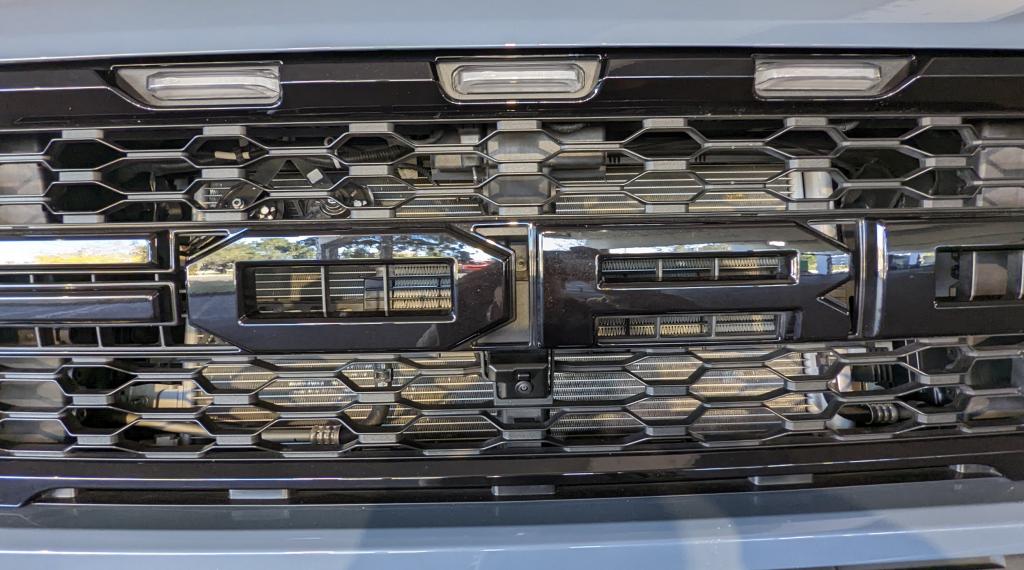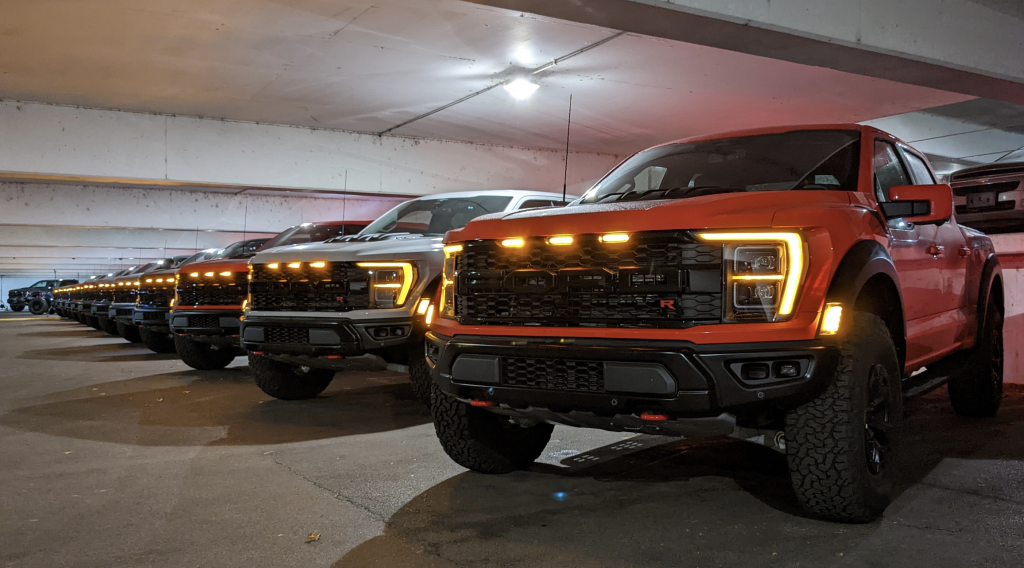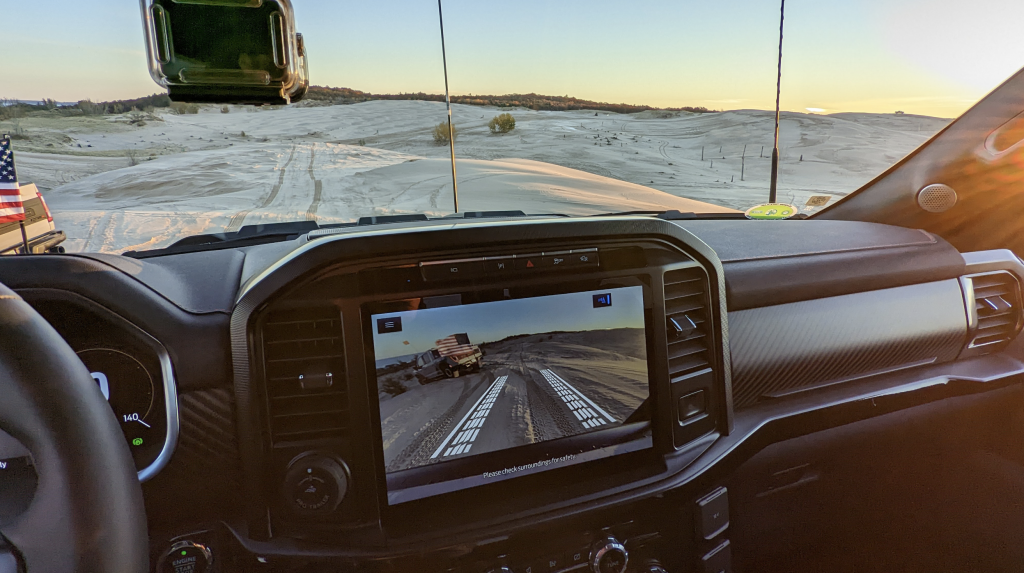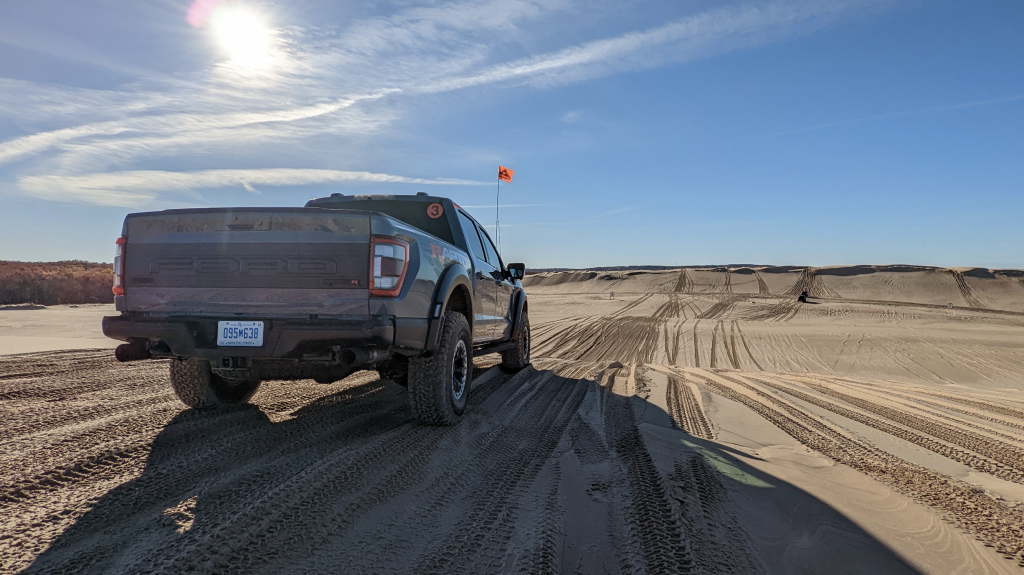First things first: Listen to this thing:
Okay, now to the review. Actually, just one more:
To those of you who have become used to my deep-dive reviews, I’m sorry: This is not one of them. I’m not sure what I was expecting when I arrived at Ford’s press event at Michigan’s fabled Silver Lake Sand Dunes — a legendary proving ground that The Big Three use for off-road testing — but what I got was Ford essentially telling journalists, simply “Hey, we threw a GT500 engine into our Raptor” and then sending us out to destroy dunes for five hours. It wasn’t exactly earth-shatteringly insightful, but it was epic. And let’s be honest: That’s really all this truck and media drive were going for. [Full Disclosure: After failing to get my 2009 Chevy HHR back on the road due to a horribly-designed front lower control arm fastening strategy, I hopped into my trusty 1985 Jeep J10 and drove from the metro Detroit area toward the west side of the state, where Ford put me up in a hotel, fed me food, and gave me the keys to trucks costing well over $100 grand. My pickup scored 14.5 miles per gallon, so about the same as the Ford F-150 Raptor R. Except down almost 600 horsepower. -DT] My chariot of choice from my house in Troy, Michigan to the Silver Lake Sand Dunes on the west side of the state was my 1985 Jeep J10. I had been planning to take a 2009 Chevrolet HHR, but as I wrote about recently, replacing the lower control arms took about 900 times longer than I’d anticipated, throwing a wrench into my plans. My drive was loud, and it probably melted an ice cap or two, but as always, my Full-Size Jeep (FSJ as it’s called) rolled through that three-hour trip without issue, arriving at Ford’s hotel, where it met the stars of the show:
I’m not going to go on about pedestrian safety or emissions concerns or other outrage-topics that could get me anointed king of Twitter, but I will just say in reference to the photo above showing my full-size Jeep appearing no bigger than a 660cc Kei Truck: Damn these 37-inch tire-equipped F-150 Raptor Rs are humongous. After parking, I headed to Ford’s presentation, which included a rolling chassis:
It Seems Like Supercharged V8-ifying The V6 Raptor Wasn’t That Hard
Take a look at the chassis above, and you’ll see in blue the changes this generation of F-150 Raptor (non-R model) saw over the last-gen Raptor, in yellow the changes over the regular F-150 (that’s a five-link rear axle instead of leaf-springs – a setup that Ford says offers better lateral stability and better traction, among other advantages), and in red the changes the R model brings over the non-R. As you can see, the only red bits are the front springs (5 percent stiffer!) and a pair of tow hooks.
The driveline is largely unchanged, as well. Bolted to the monstrous V8 engine (which we’ll look at in a sec) is a 10-speed “10R80” automatic transmission just like the one in the EcoBoost V6 truck. I spoke with Ford engineering manager, Derek Bier, about changes over the worse-sounding F-150 Raptor, and he said there really wasn’t a whole lot aside from a bigger-diameter rear driveshaft and a new torque converter (which you’d expect given that it’s bolted to a new engine). The transfer case, even, has been around for over five years now, having had to deal with the loads imparted by the 3.0-liter diesel engine formerly offered on Ford’s quarter-ton truck. In fact, when I asked if he could point out other chassis changes over the V6 Raptor, Bier showed me a snubber on the front axle housing (which, it’s worth noting, “features…a more robust, higher-strength carrier casting and an aluminum-ribbed structural cover to manage the powertrain’s added torque,” per Ford). Let’s look at some rubbery snubbery goodness:
Apparently Ford added this snubber late in the F-150 Raptor R program after noticing during validation testing too much torsional deflection in that front axle housing at high loads. You “live and learn,” Bier told me. “We fail and we learned and we adjusted.” Late program changes in the auto industry are nightmares for engineers, as it can be costly to rush components into production (especially since they can require other changes to the overall system), and they can disrupt all sorts of aspects of vehicle development that should already be set in stone (like the assembly process). This particular late change seems like a fairly minor inconvenience; it’s a bit of rubber on a fairly basic bracket, bolted to a boss that already existed. Anyway, the point is that we’re talking about front springs, tow hooks, rear driveshafts, front axle casings and snubbers, here — given how little changed hardware-wise (software is different, as the ABS and suspension tuning were almost certainly not simple jobs) between the V6 truck and this firebreathing V8 machine, it’s clear that the the chassis and drivetrain had been begging for more power. And boy did they get it.
Behold the Predator engine, a 700 horsepower supercharged V8 beast also found in the 760 horsepower Ford Mustang Shelby GT500. The F-150 Raptor R’s program manager, Tony Greco, talked about why the F-150 Raptor is finally getting the V8 it deserves (instead of just an engine with the word “Eco” in it, which I always found a bit odd in a truck like the Raptor), saying “Once you develop the chassis, then you can think about bringing power.” He told journalists Ford wanted to make sure the chassis was “worthy.” “We spent a lot of time trying to make sure that engine could breathe and that it could growl,” he said, mentioning the unique intake and exhaust. “That’s something we delivered on because the customer was asking for it.” After admitting that the truck looks largely the same as any other Raptor (sans some graphics, a unique hood, some badges, special carbon fiber trim on the interior, some grille changes, a few other odds and ends) Greco said “[The truck] is really not about the appearance inside or out.” It’s all about that motor, which only adds about 100 pounds over a similarly-equipped V6 sibling.
You may be wondering about the truck’s lower horsepower figure when compared to the GT500. This, powertrain engineer Brian Lizotte told journalists, can be attributed to the fact that the Eaton TVS R2650 blower up top features a smaller pulley diameter in order to “fill in…mid-range torque” for the truck application. You can see some of the changes Ford made to the GT500’s Predator engine for the F-150 application in the great video (shown above) by Autoblog’s Zac Palmer. Lizotte talks about how, in addition to the supercharger pulley ratio change, there’s a re-tuned crankshaft damper, a new oil cooler, a deeper sump (since there’s more room on the truck than in the GT500 and since the steep grades a truck deals with off-road and while towing could benefit from a deeper sump), plus changes to the intake and exhaust system. (Speaking of the exhaust system gives me an excuse to point out the beautiful cast aluminum exhaust hanger below).
I chatted with Lizotte over dinner, and he really did make it seem like dropping this motor into the F-150 Raptor engine was child’s-play. “You’d think that the truck duty cycle would be harder,” he told me, “It’s really not.” He went on to say that temperatures and loads tended to be higher on the track-oriented Mustang. “The GT500 was more challenging because the on-track performance aspects of that car,” he said. “You’re literally using every bit of that engine on a track,” noting oil management challenges during high lateral (in corners) and longitudinal (during braking) acceleration events that led the team to develop active baffles. On track, he told me, you just see such high vehicle speeds, high loads. As a result of the driving conditions being less severe in many ways, plus the additional packaging space in the truck, putting the Predator into the F-150 Raptor “was a very seamless execution,” Lizotte told me. Vehicle Integration engineer Keith Westin was also at dinner while Lizotte and I were chatting about the Carnivore’s motor. I asked Westin about the truck’s 8,700 pound tow rating, and why that’s not higher given what other F-150s with less power can tow. “If we were to rebalance the attribute’s around trailer tow…[it’d reduce off-road capability],” he said, noting that there’s plenty of power and cooling capacity on hand. He didn’t say it directly, but it’s fairly clear that the truck’s dynamics play into the limited-but-still-solid trailer tow figure, as the softer suspension is meant for bashing dunes, not dealing with a big trailer hanging on back.
“What the hell?!” a powertrain cooling engineer who just read my paragraphs above is probably yelling aloud right now, still recovering from many months of analyzing CFD airflow and 1-D fluid flow simulation results. “This fool thinks slapping 250 horsepower worth of additional V8 goodness into a truck is just trivial…Does he know what I had to do to make this work?!” Yes, yes I do! Don’t worry, dear cooling system engineer, I realize that developing a cooling system for a new powertrain is a job and a half, and so as a former cooling system man, I feel the need to show off your design to the world. Look at the photos above and check out the dual fans pulling air through a low temperature radiator (for the engine’s intake manifold-integrated charge air cooler) mounted directly behind the bumper beam. I’ve always admired this setup on the Raptor, since it gives the truck a “lower” grille opening without that opening actually being below the bumper, which would intrude on the vehicle’s approach angle and compromise off-road capability and durability. Just cut a hole in the bumper itself, and Bob’s your uncle; I wish I could have done this on the Wrangler and Gladiator. In the photo above, you can see a frame-mounted transmission oil heater (a fuel economy enabler), and in the main grille below you can see a transmission cooler and a condenser mounted ahead of the main radiator:
I’m sure ADAS and dynamics engineers who had to calibrate stability control are also displeased with how trivial I’m making this V8 install job sound, but relatively speaking, it’s clear this wasn’t rocket science. The chassis was overbuilt and ready for the power, the driveline was also ready to go, and the V8 engine had gone through heaps of hard-core development for the GT500 so it’d handle a truck’s demands and packaging restraints without issue.
A post shared by The Autopian (@theautopian) Yes, Ford basically just popped a V8 engine into its Raptor. And honestly, the result is what you expect: Pure unadulterated glory.
What’s It Like On The Road?
Fatigued from my ride in my absurdly loud 1985 Jeep J10, the six hours of sleep I got weren’t enough, but alas, Ford has journalists departing from the hotel parking garage at 6 A.M. Check out the over 7,000 horsepower worth of trucks in the image above. We hit the road while it was still dark out, but the course wasn’t set up to test the vehicle’s on-road handling. The roads were largely straight and smooth, and really, they were just a way to get to the dunes. Ford F-150 Raptor R is a desert basher, so our trip would be largely off-road focused.
All I have in my notebook about the on-road ride is that the driver sits so high it feels like she/he is on stilts. I also noticed that there was a bit of exhaust sound while cruising — a slight drone from the rear of the car (while in the car’s Normal drive mode). It wasn’t bad, and it’s possible the “quiet” drive mode would shut it up a bit more, but in “normal” things could have been quieter. The exhaust mixed with the tire noise to create a bit of a low-pitched highway sound, though wind noise was incredibly subdued given the truck’s size. What wasn’t subdued was the sound of a blown V8 when one of the folks in my group decided they couldn’t resist stomping the forward pedal, no matter how early in the day it was. Just a quick stab of the gas, and the transmission downshifted quickly, the exhaust valve bypassed the muffler, and the Predator yelled into the cool Michigan morning. We didn’t hear many wide open throttle (WOT) pulls, since we were all trying to avoid waking neighborhoods, but the few drivers who did “give ‘er” set the rest of us for what was to come.
While enjoying a comfortable ride and some nice and bright headlights, I couldn’t help but notice how little gas I had to apply to just drive down the highway. My right foot’s big toe rested gently against that pedal to keep the truck from speeding. This took getting used to. Within 45 minutes we found ourselves in front of Ford’s tent in a big dirt lot just outside of the Silver Lake Sand Dunes off-road park. There, we hopped into different F-150 Raptor Rs — ones outfitted with visibility flags and radios for communication — and then hit the sand.
A Monster In The Dunes
Our convoy had gotten up early to snap some sunrise photos and so we could have the park all to ourselves. It’s easy for journalists, or really anyone who has been doing the same job for a number of years, to become jaded. “Another powerful truck; been there, done that,” they might say. That morning in a convoy of over 7,000 supercharged V8 horsepower, watching the sun rise in a humongous sandy paradise that we had all to ourselves made it impossible to fall into that mindset. This was epic, and there wasn’t a single cynical thought that could convince me otherwise.
One of the very first things I did was conduct perhaps the most important test an off-road vehicle can endure: the donut test.
Donuts
An off-road vehicle, especially one with lots of power, must be able to rip donuts. This is written into the American constitution, and thankfully — based on all the stars and stripes hanging off of the group leaders’ trucks (see photo before the one directly above) — it’s clear The Blue Oval reads that document daily, possibly even hourly. The result is nice, tight, loud donuts in both two and four-wheel drive.
The gentleman representing the luxury-focused publication Robb Report was kind enough to, upon my request, hammer his truck’s throttle with the steering wheel at full lock; I watched in awe as the whole body leaned hard on that soft, flexy suspension, jacking the front inside wheel well off the ground, squatting down on that rear outside rubber. The whistle of that supercharger along with the growl from 5.2-liters of high-revving internal combustion added to the flinging sand and hard-leaning truck to create a scene of both utter violence and magnificent truckish tranquility.
Later, after Jalopnik writer José Rodríguez Jr. (who is possibly the nicest person in this industry, and who shot the second video in this article) uttered the words “I’ve never done donuts before,” I made it a mission to free him from the prison cell he’s unknowingly been living in his entire life. Before this, while the rest of the team was using the bathroom, it dawned on me that I was sitting in a 700 horsepower truck in the middle of an empty sand dune, just waiting for people to expel the contents of their bowels. I figured I’d leave the wasting to the rest of the team, so I drove out onto some flat sand and “ripped some shitties.” I struggled to do donuts in two-wheel drive due to traction control cutting in. In Baja Mode and four-wheel drive, the traction control light flickered as I gave the rightmost pedal as much foot as I could, and the truck applied brakes and seemingly manipulated the power I was trying to send to the wheels, but nonetheless the donuts were nice and crisp. Behold:
Here’s my donut-circle. Fairly tight!:
Then it was José’s turn to receive automotive enlightenment for the first time. In perhaps a display of beginner’s luck or just sheer competence or good karma for being such a nice dude, José turned out to be the Peter Brock of donuting — the king of the dunes. Check it out:
Here’s his tight donut circle, which he actually managed to make in two-wheel drive (Maybe I had been in the wrong drive mode?):
Anyway, as I mentioned at the top of this review, the truck is epic, but hardly profound, and that rings true about this review. “This 700 horsepower Raptor can rip some nasty donuts” isn’t going to win me a Pulitzer, but you know what? Who gives a damn how uninsightful this is; this is a badass supercharged Baja-truck, and I’m going to keep telling you how great it is on the dunes, even if you could have predicted that.
Jumping
Ford set up a jump for the Ford F-150 Raptor R; I hit it at 50 MPH, got a few feet of air, and landed softly. As with the standard Raptor and the Bronco Raptor, the springs and dampers made the whole thing remarkably drama-free, and made me want to hit the jump even faster, which may or may not be a bad idea.
The photos above seem dramatic, but all happens quickly, and — aside from the initial bit of the jump when the front tires hit and quickly shoot the truck’s nose upward — it’s far from violent. This would not be the case with most other vehicles.
Bashing Up Steep Dunes
Test Hill. It is the steepest, most daunting hill at the Silver Lake Sand Dunes, having killed many-a-vehicle that has tried to make the climb. I myself took a 1995 Jeep Cherokee on 31-inch all-terrains up test hill, but never managed to summit. I remember jamming the XJ’s gas pedal to the Wi-Fi floorboard (that’s what the kids these days call floors that don’t exist due to rust), and listening to that normally-low-revving 4.0-liter straight six sing an awful tune as the revs climbed beyond 3,500 RPM. I was trying to build some momentum at the base of the hill so I could climb at speed, and maybe make it all the way up.
You’d think, if I backed up far enough, I could build up enough speed to just coast right up, but the terrain was too uneven to drive beyond 40 mph without that leaf-sprung rear axle wanting to buck the Jeep onto its lid. I remember my suspension squatting hard and violently when I reached the incline, and the Jeep slowing down quickly. I got so close to the summit, but no matter how hard I pressed the pedal, there was just nothing getting to the wheels. I remember pressing the gas pedal and none of my wheels spinning. “Uh, what the hell? Where’s all that power going?” I remember thinking before immediately letting off the pedal, realizing this was probably not good for my transmission. I just didn’t have enough torque at the wheels due to improper gearing and lack of power.
The Ford F-150 Raptor R made Test Hill look like a speed bump. Not only could I approach the hill at 100 mph if I wanted to, since the high-travel, Fox shock-damped five-link coil sprung rear axle and double-wishbone front suspension were designed specifically to glide over surface undulations at high speeds, but even when the truck slowed down and the momentum began to wane, the accelerator unleashed so much power even at partial throttle that forcing the truck up and over Test Hill just wasn’t a problem. I’m not sure how steep a dune would have to be before the F-150 Raptor R actually breaks a sweat, but I’m guessing it would result in the truck doing an “endo” onto its lid.
A few things I noticed while climbing dunes: First, the front-facing camera comes in clutch when reaching the peak. I’m glad it’s there. Second, the traction control in Baja Mode kicks in more than I’d like. Maybe it’s somehow saving me from myself, but it sometimes seemed to pull power when power was what I needed (like when I approached the top of a dune). It’s my understanding that the off-road-only (you get a notification of this on the screen) Baja Mode shuts off traction control as much as Ford will allow; maybe there’s a way to defeat the system even further, but in Baja mode I felt that sometimes the ABS system was too intrusive.
Another thing I noticed while unleashing the 5.2-liter V8’s fury onto those dunes was that, on a few occasions, I found myself a bit startled by a lack of braking after I tried slowing down on the back side of an incline. I’d accelerate, spin up the tires, get up a tune, and then once I reached the back side, I’d want to slow down as I descended, but it took a while to slow down. I’d hit the brake pedal and, for about a second, nothing would happen. Obviously, some of this has to do with sand shifting below the tires, but it also has to do with the moment of inertia of those giant “37s.
In order for a vehicle to slow down, the tangential velocity of the tire tread has to be the same or lower than the relative velocity of the truck to the ground. So when I let that maniacal motor spin those tires up to absurd speeds, pressing the brake pedal first had to slow them down before it could slow the truck down. This wasn’t a big deal, but it was a little nerve-wracking at first, and undoubtedly those huge tires are a contributing factor.
Drifting
In Baja mode, the truck can drift beautifully. Go into a turn a bit too hot, let the tail step out, steer away from the turn, and press the pedal, and the whole truck will drive sideways like it’s on casters, creating the next Dust Bowl, revving its lovely motor, and making you feel like a bonafide Ken Block. One of Ford’s engineers was just flicking the truck around the dunes effortlessly, but in a way that had me in awe, as the truck must have been going sideways at at least 60 mph. The guy was a madman.
Drag Racing
Ford had a drag racing “track” set up. I spent about a half an hour just blasting the truck up to about 80 mph on the flat sands, racing other trucks, and just listening to that lovely motor. It was during this part of the drive that I decided I wish the engine were about 5 percent louder. The actual exhaust note is lovely — borderline perfect — but I found myself rolling the windows down to get more volume. That’s the tradeoff when you’ve shoved so many NVH enablers into a truck to give it a quiet on-road ride, but you still want an aggressive exhaust — that cabin wants things to be quiet, and even with those exhaust valves fully open, I didn’t think there was quite enough of that beautiful noise bouncing through my external acoustic meatus. It seemed that no other journalist agreed with me on that, so maybe I’m just a redneck whose taste has been ruined by a few too many straight pipes.
Is The F-150 Raptor R Pointless?
The answer to the subhed above is “yes, pretty much.” Nobody needs a 700 horsepower supercharged V8 pickup truck that can drive over dunes at triple-digit speeds, execute beautiful drifts, rip tight donuts, and blow other machines’ doors off on drag strips. But then, if you think about it, many of the greatest things in this world are pointless, or at the very least unnecessary. Hell, this very website is devoted to car culture; could we all just ride trains or commute in boring little fuel-efficient econoboxes? Sure. That might even be more sensible. But we don’t, because we like V8s and V4s and rotaries and stick shifts and bench seats and vent windows. The way we derive joy is usually not rational, so when you look at this truck through that lens, it’s hard not to love it. The truck was literally built to handle more power, and for many years now, many who have driven an F-150 have prayed for a better sound — finally, the Raptor R gives the truck the motor it always deserved. The result is that the truck accomplishes its intended function better than ever, and if you look at the most prolific cars in history, many of them, like the F-150 Raptor R, perform one function extremely well, and make sacrifices to do it. Would I want to daily drive a Ferrari F40 or a World War II Jeep or even a 911 GT3? Well, sure, but it wouldn’t be as comfortable or efficient as in a more sensible car. I think that’s fine. These machines set out on a mission that just so happens to focus more on use cases that typical drivers don’t see often instead of on things like comfort and efficiency, and they accomplish that mission beautifully. This Raptor R is meant to be the ultimate dune-crushing pickup, and it does that swimmingly, and I have to respect that even if it comes with major compromises elsewhere. Plus, when it comes to assessing this truck, it’s worth remembering that we’re at the end of an era right now. High-horsepower gasoline pickup trucks are going the way of the Dodo soon as the world gradually makes its transition to electric vehicles, and though it’d be easy enough to pan the Raptor R for scoring 14 MPG highway and having a hood so high some adults might need a stool to change the air filter, I’m instead going to celebrate it as a genuinely impressive conclusion to the internal combustion era in pickup trucks. The last chapter is a 700 horsepower monster that makes great noises, crushes sand dunes, and violently rips donuts. Game of Thrones could learn a thing or two from Ford. This is the shit we’re talking about. These Raptor trucks are not that much bigger than your run of the mill F150/Silverado/Ram 1500 these days. I occupy a location where you can find parking lots with all of the above models, including a normal Raptor regularly. I remeber a time when I could enjoy a refreshment on a tailgate and my feet would touch the ground, now I need a ladder to get something out of the bed. A few weeks back, we ran across a Denali 3500 in off road spec, didn’t look absurdly lifted, the hoodline was taller than my above average height wife. Drive what you want and all that, but what if I want to buy a truck I can still reach into the bed of, but can still haul enough cement to build a new fence? Personally, I think the 7.3 with a sportier tune should be the base engine, with this one optional. Still it looks like Ram has their work cut out for them, and I can’t wait to see what they come up with next. So is Ford saying this is the first time this attachment point has been used even though Raptor differential housings have had this attachment point since day one? I have read but can’t confirm that the 4.10 gearset required more clearance anyway so it needed a different SKU for the housing. When I did my swap I used the Raptor housing. I did not swap the Torsen and 4.10 gearset into my original housing. Here are some pics: https://imgur.com/gallery/jEiMWGO The TRX came out and it was a revelation in absolute insanity. And then Ford did…nothing. Then they mentioned this was coming out…and then…nothing. It finally came out and meh. It’s great and all but…meh. Is The Ford Bronco Raptor R Pointless? I’d argue yes, but weren’t we talking about a F-150? So sure, it looks fun, but Fck that thing, fck its price, and fck Frd for making it. Seriously. To see a J truck dwarfed by a modern half ton is mind blowing to me. Makes me want one even more though. The bed also wraps up over the edges and makes the bed opening a bit smaller than a Chevy/Ford/Dodge – I believe most guys with one have to get mid size truck toolboxes or bed covers because they are a bit small for a full size truck. The advantage to all this is – my J20 was lifted about 4-6″ and … it’s really not noticeable – most people just think it came from the factory with 33’s on it. I’m just gonna say it: When David Tracy says that something threw a wrench into his plans, I am pretty sure actual wrenches were actually thrown.


































